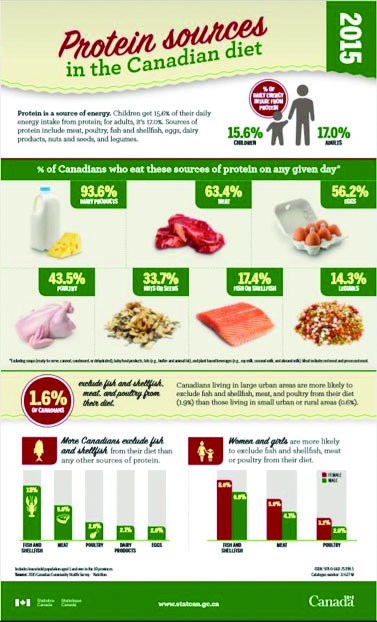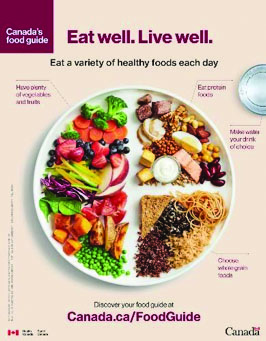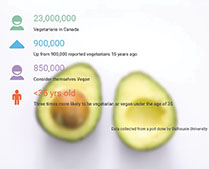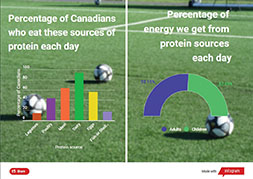By Jessica Alberga
Everyone loves a good trend. A fad that literally has people of all avenues talking about it. Owning a Toyota Prius for example or buying a personalized coffee machine. But the most memorable trends we tend to cling to are the ones that make our brains healthy and keep our bodies moving.
Clean eating has become more than just kale chips and spinach smoothies. More and more Canadians are finding alternative ways to find the nutrition that best suits them.

According to Statistics Canada, adults get 17 per cent of their daily energy intake from protein. The misconception that the common meat and potato plate is a better-balanced diet is a thing of the past. In 2019, more than half of Canadians eat meat alternatives by choice. The palates have changed over the years. Thankfully we now have an updated food guide that better encompasses all nutritional options for Canadians.
As we each live and breath, our brains develop differently and rely on different sources for nutrients. Not every person will have the same eating habits. Getting the supplies your body needs to be at it’s best can come in many different ways. OCAA athletes are no different.
On the varsity soccer field, Algonquin Thunder player, Philomene Sully-Bitsi, 18, has one thing in mind, winning. Her targets are set, her mind is focused, and her body needs to be properly nourished to allow her to excel. The Thunder striker works out six times a week, plays games every Sunday, and trains incredibly hard with her team. And she also happens to be a pescatarian.
A pescatarian is someone who abstains from eating meat and poultry but rather enjoys fish for main sources of protein, they essentially live a vegetarian lifestyle with fish.
Once realizing a full vegan lifestyle was “too hardcore” she found herself cutting all meat / poultry and dairy from her diet instead.
“I eat a lot of fish, and a lot of shrimp, veggie burgers and a lot of eggs. It’s given me a new range of options,” said Sully-Bitsi.
Her mom was on board with her decision to remove meat and poultry from her diet but suggested incorporating fish to add more sources of protein. “If you are eliminating foods like meat or dairy, it’s essential for you to replace these with plant-based alternatives,” said Ottawa registered dietitian and nutritionist, Susan MacFarlane.
Sully-Bitsi got the idea of removing items from her diet after watching her older brother go through the same thing and witnessed the benefits he was experiencing. He felt lighter and more active. So before the summer ended, she decided to take on some dietary changes herself. him feeling lighter, and more active.


Her go to snacks are bananas, blueberries, raisins, protein bars and hard boiled eggs.
“If I don’t start my day with a hard-boiled egg, I feel empty,” said Sully-Bitsi.
Sully-Bitsi hits the gym frequently, always with her water bottle in hand. She never let’s it get empty, for her hydration is key.
Much like cross country runner from the University of Toronto, Mississauga, Gabriel Porter, 25. He finds drinking water to be a vital element in staying active and healthy.
“If you’re not drinking water your body is working overtime, and it can’t absorb the proper nutrients it needs,” said Porter.
Porter started eating a vegan diet after the diagnosis of a chronic illness. Chiari Malformation Type 1. Where part of the brain called the cerebellum, herniates through to the spinal canal, putting pressure on the spine.
“Mine is considered mild but before my diet changes I was affected a lot more than I am now, and I wasn’t able to run at all,” said Porter.
After being diagnosed and gradually eliminating foods from his diet, he began to notice a tremendous change in his body.
“I never have to worry about how I’m going to perform now because I know what’s going into my body.”
Since cutting red meats, poultry and processed foods out of his diet, his overall health and running started to improve.
“I stopped feeling so lethargic all the time and it helped with overall muscle recovery after intense workouts too.”
“When I don’t follow my diet I basically can’t run at all,” said Porter.

Porter stated an important thing to keep in mind when eating a vegan diet, is keeping iron counts up. He supplements his iron by taking B12 vitamins and iron pills.
“I find that vegan male athletes have very little challenges when it comes to eating a vegan diet (as their calorie intake is so high, they can easily meet their requirements for protein and nutrients). When it comes to female vegan athletes, it can be difficult to get enough iron through diet alone, especially for small-bodied athletes. In these situations, adding an iron supplement can be hugely beneficial,” said Macfarlane.
“Make sure you are taking the right nutrients. All vegans need to supplement with vitamins B12 and D, and ideally, DHA (omega 3). In addition, it’s essential to ensure that a reliable source of iodine is consumed.”
Porter was taught by his parents growing up that you don’t have to eat meat every day, it was never part of his norm. At a young age he found a love for vegetables.
He cooks regularly for himself and always finds that to be a better option than going out to eat.
“Even when there’s variety it’s best to stick with what you know and cook for yourself.”
“I love hummus, [I’m] a huge fan of chickpeas, if they weren’t around I don’t think I’d be around either,” said Porter.
Porter runs six times a week, bikes three to four times, and trains in the gym at least twice a week. He’s consistently feeling better by eliminating those foods and his performance continues to get better.
Like both Sully-Bitsi and Porter, most Canadians continue to eliminate meat from their diets. In a poll conducted by Dalhousie University it was reported that there are 2.3 million vegetarians in Canada, up from the 900,000 reported 15 years ago. Another 800,000 consider themselves vegan. Those numbers make up for 9.4 per cent of Canada›s population.

“I have been vegan for almost 4 years now,” said Miller.
For UTM soccer player, Sydney Miller, 19, her vegan diet changes began after witnessing the harsh treatment of animals and the straining effects those foods have in her society.
“I first began living a vegan lifestyle after watching videos displaying both the treatment animals living in factory farms and the effects on our environment, which made me realize I couldn’t support the dairy/meat/etc. industries anymore.
“I have been vegan for almost 4 years now,” said Miller.
Eliminating dairy for Miller in particular helped improve her stamina. She felt a reduction with inflammation in her body. Miller feels that she now has a healthier relationship with food.
“There’s no guilt associated with anything I choose to eat,” said Miller.
Miller feels her performance on the field isn’t hindered by her diet choices, and she may even have more energy than her meat eater teammates.
“What’s important to keep in mind is that athletes have specific requirements for nutrients, not food. Provided a vegan athlete is consuming adequate calories, including high quality sources of plant-based protein (i.e. soy), and taking necessary supplements, they are at no disadvantages compared to omnivore athletes,” said Macfarlane.
Miller’s go to snacks are apples and peanut butter, granola bars, (homemade or Larabar/Cliff) and hummus with carrots. Miller drinks at least 6 litres of water a day and exercises five to six times a week.
“If anything I tend to have slightly more energy than some of my omnivorous teammates,” said Miller.
“I’m also a proponent of eating mostly whole-foods, so there’s clearly endless variety in the amounts of: fruits, vegetables, grains, nuts, plant-based protein.”
When Miller first went vegan, four years ago, she found it very hard to get any ‘replacement’ foods such as non-dairy yogurts or plant based mock meats. Now she finds the popularity is increasing and the volume of new products is growing all the time.
Over 6,400,000 Canadians are eating a diet that restricts meat. That number may continue to grow. The point to remember is that we don’t all require the same dietary needs and we don’t all have to fit in the same box or category.
A meat-eating athlete has no significant benefits over their veggie eating comrades. Finding what works best with your needs and lifestyle is all that matters.


